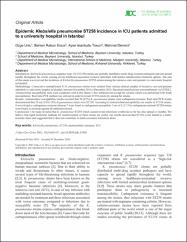Epidemic Klebsiella pneumoniae ST258 incidence in ICU patients admitted to a university hospital in Istanbul
Özet
Introduction: Klebsiella pneumoniae sequence type 258 (ST258) strains are globally distributed multi-drug resistant pathogens and can spread rapidly throughout the world, causing severe healthcare-associated invasive infections with limited antimicrobial treatment options. The aim of this study was to reveal the incidence of Klebsiella pneumoniae ST258 strains among the intensive care unit patients in a university hospital in Istanbul. Methodology: Consecutive nonreplicated 83 K. pneumoniae strains were isolated from various clinical samples of intensive care unit patients admitted to a university hospital in Istanbul, between November 2016 to December 2018. Bacterial identifications were performed via VITEK2. Antimicrobial susceptibility tests were conducted with Kirby Bauer's disc diffusion test except for colistin which was performed with broth microdilution. Real-time PCR method was utilized in order to reveal ST258 positivity among the strains. Results: Antimicrobial susceptibility results revealed that 56 (67%) K. pneumoniae strains were carbapenem-resistant. Real-time PCR results demonstrated that 15 out of 83 (18%) K.pneumoniae strain were ST258. According to antimicrobial susceptibility test results of ST258 strains, 8 were found as carbapenem-resistant whereas 7 were found as carbapenem susceptible. 3 out of 8 (37.5%) carbapenem-resistant ST258 strains were found as resistant against all antibiotics tested. Conclusions: Our study revealed that K. pneumoniae ST258 which caused severe infections worldwide so far has also spread to Istanbul. We believe that rapid molecular methods for monitorization of these clones are useful. our results showed that ST258 is not linked to a multiresistant strain and suggested that it does not contribute to multi-resistance formation alone.



















